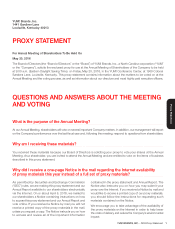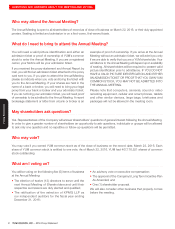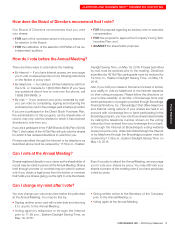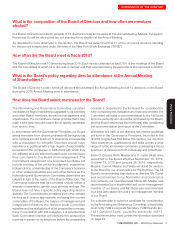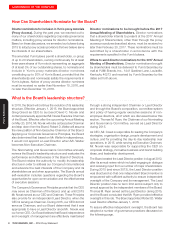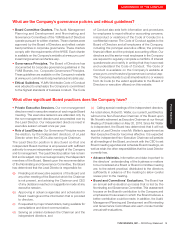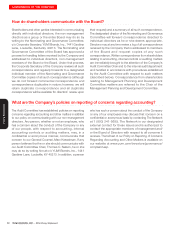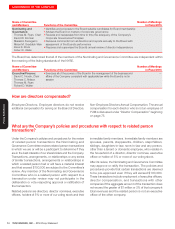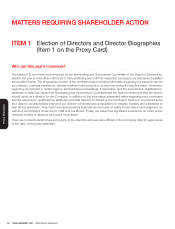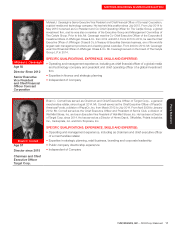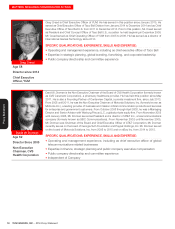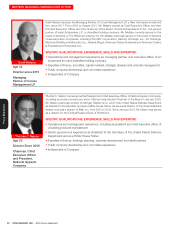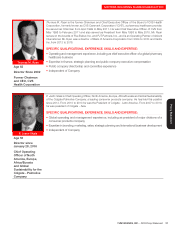Pizza Hut 2015 Annual Report Download - page 25
Download and view the complete annual report
Please find page 25 of the 2015 Pizza Hut annual report below. You can navigate through the pages in the report by either clicking on the pages listed below, or by using the keyword search tool below to find specific information within the annual report.
YUM! BRANDS, INC.-2016Proxy Statement 11
Proxy Statement
GOVERNANCE OF THE COMPANY
on this review, the Committee concluded our compensation
policies and practices do not encourage our employees to
take unnecessary or excessive risks.
As part of this assessment, the Committee concluded the
following policies and practices of the Company’s cash and
equity incentive programs serve to reduce the likelihood of
excessive risk taking:
•
Our compensation system is balanced, rewarding both
short-term and long-term performance
•
Long-term Company performance is emphasized. The
majority of incentive compensation for the top level
employees is associated with the long-term performance
of the Company
•
Strong stock ownership guidelines are enforced for
approximately 400 senior employees
•
The annual incentive and performance share plans both
have caps on the level of performance over which no
additional rewards are paid, thereby mitigating incentives
for executives to take unreasonable risks
•
The annual incentive target setting process is closely
linked to the annual financial planning process and supports
the Company’s overall strategic plan, which is reviewed
and approved by the Board
•
Compensation performance measures set for each division
are transparent and tied to multiple measurable factors,
none of which exceed a 50% weighting. The measures
are drivers of returns and are transparent to shareholders
•
The capital allocation process is driven by strategic
objectives, aligned with Division annual operating plans
and requires capital expenditure approval, ensuring
alignment with development and return requirements
•
The financial performance which determines employee
awards is closely monitored by the Audit Committee and
the full Board
•
The Company has implemented a robust recoupment
(clawback) policy
How does the Board determine which directors are considered independent?
The Company’s Governance Principles, adopted by the
Board, require that we meet the listing standards of the
NYSE. The full text of the Governance Principles can be
found on the Company’s website (www.yum.com/investors/
governance/principles.asp).
Pursuant to the Governance Principles, the Board undertook
its annual review of director independence. During this
review, the Board considered transactions and relationships
between each director or any member of his or her
immediate family and the Company and its subsidiaries
and affiliates. As provided in the Governance Principles,
the purpose of this review was to determine whether any
such relationships or transactions were inconsistent with
a determination that the director is independent.
As a result of this review, the Board affirmatively determined
that all of the directors are independent of the Company
and its management under NYSE rules, with the exception
of David C. Novak, Greg Creed, and Jing-Shyh S. Su.
Messrs. Novak, Creed and Su are not considered
independent directors because of their employment by
the Company.
In determining that the other directors did not have a
material relationship with the Company, the Board determined
that Messrs. Cavanagh, Dorman, Ferragamo, Linen, Meister,
Nelson, Ryan, Skala, Walter and Mmes. Graddick-Weir
and Stock had no other relationship with the Company
other than their relationship as a director. The Board did
note as discussed in the next paragraph that Target Corp.,
which employs Mr. Cornell, has a business relationship
with the Company; however, as noted below, the Board
determined that this relationship was not material to the
director or Target Corp. and, therefore determined Mr. Cornell
was independent.
Brian C. Cornell is the Chairman and Chief Executive Officer
of Target Corp. During 2015, the Company received
approximately $12 million in license fees from Target Corp.
in the normal course of business. Divisions of the Company
paid Target Corp. approximately $2.5 million in rebates in
2015.The Board determined that these payments did not
create a material relationship between the Company and
Mr. Cornell or the Company and Target Corp. as the payments
represent less than one-tenth of 1% of Target Corp.’s
revenues. The Board determined that this relationship was
not material to Mr. Cornell or Target Corp.


